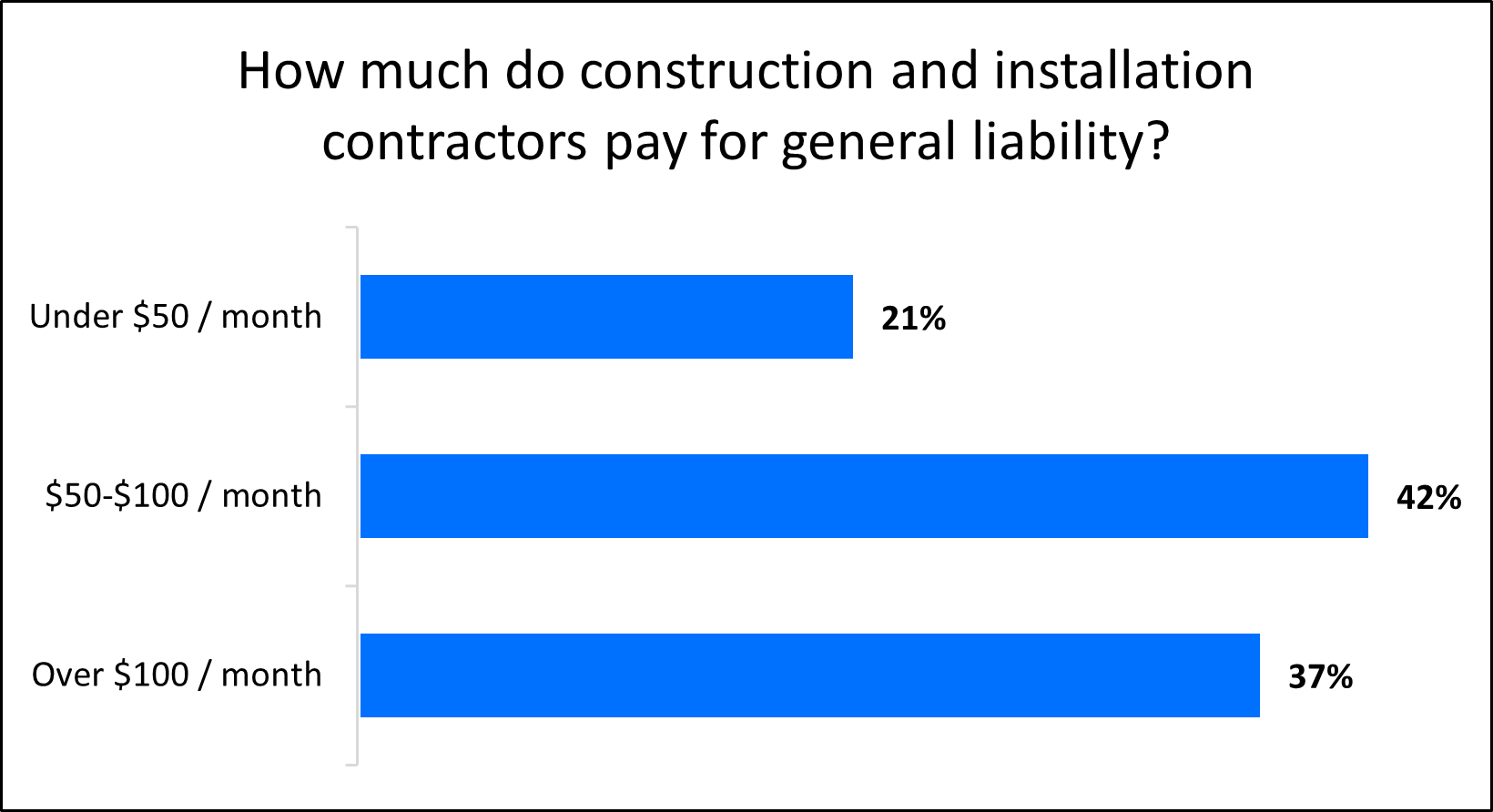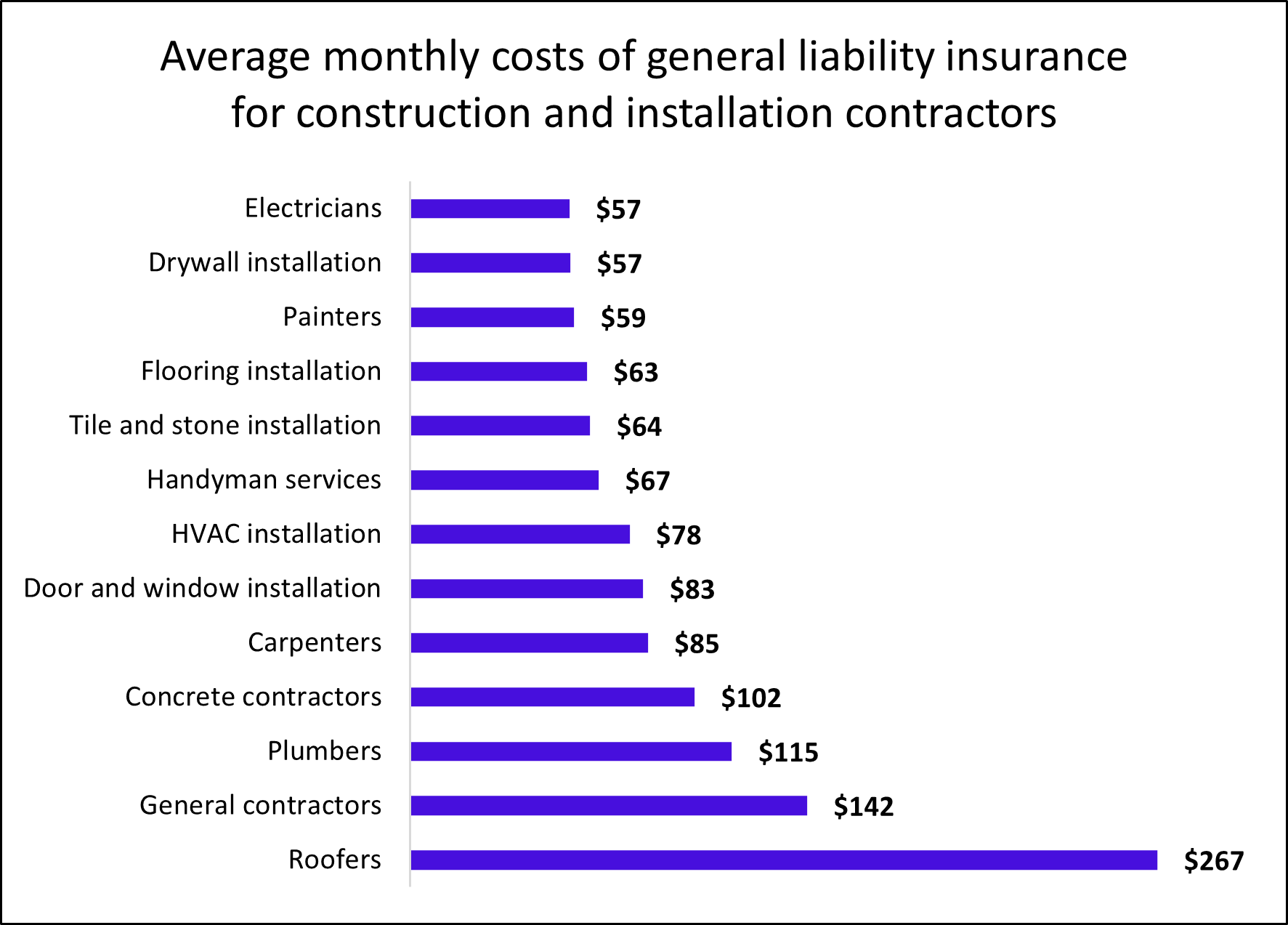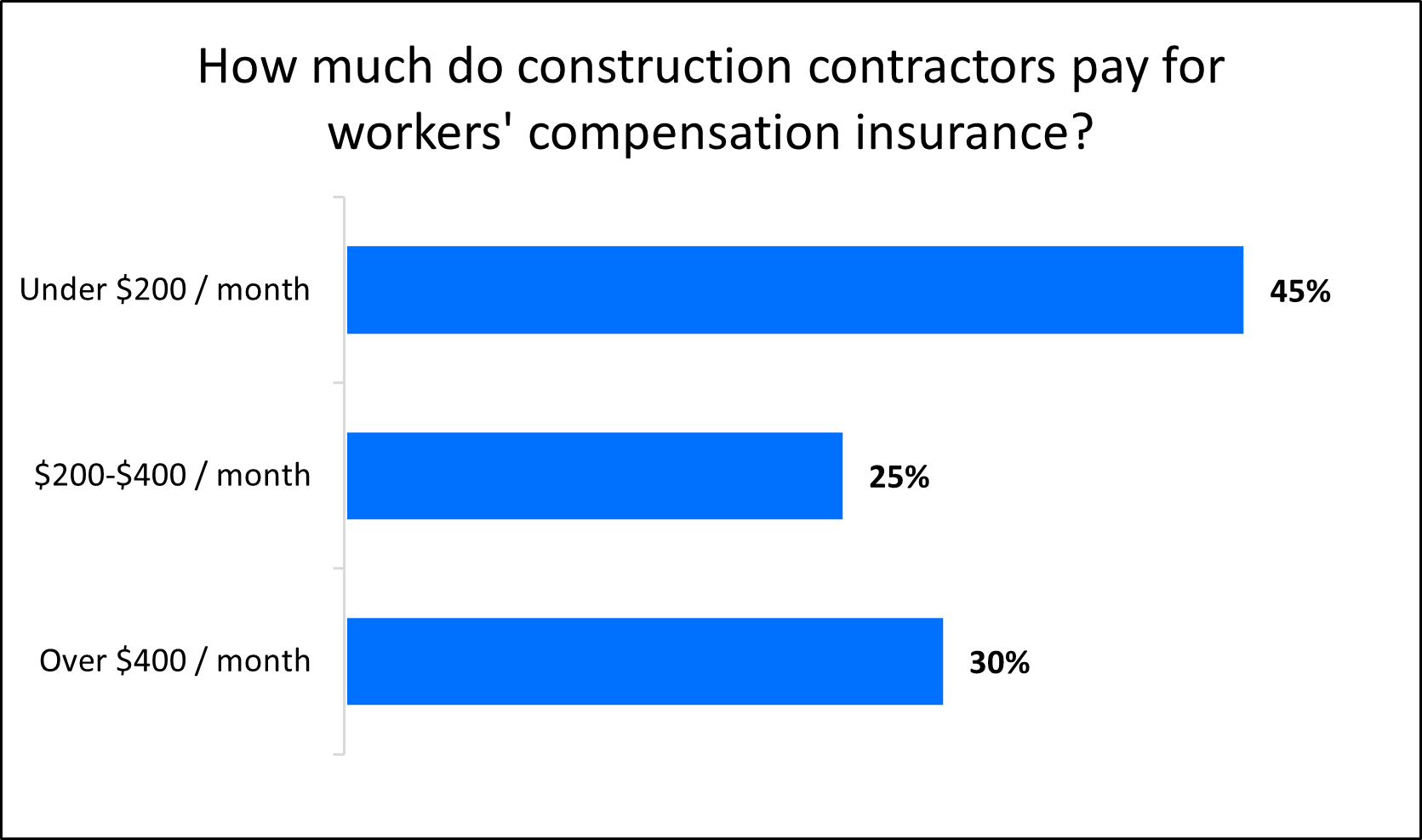How much does construction business insurance cost?
The cost of construction business insurance depends on the type of policy and the amount of coverage you choose. Insurers will also look at your industry risks, business revenue, and claims history. Save money on business insurance by comparing quotes from different carriers with TechInsurance.
Several factors affect the cost of contractor insurance
A number of factors influence the cost of construction business insurance, including policy limits, deductibles, and the size of your business.
Your industry risks also affect your premiums. In general, a higher likelihood of a claim means your business will pay more for insurance.
Overall, construction companies can save money on insurance coverage if your business:
- Has a small office
- Operates in an area with little foot traffic
- Employs few workers
- Has avoided insurance claims in the past
No single policy will cover all the risks faced by your construction company. A licensed insurance agent can help you choose the right policies that match your business's coverage needs.
Let's take a look at the top policies for construction companies and how much they cost.
Key insurance policies and their expected costs for construction contractors
Here are the top insurance policies bought by construction businesses and contractors and their average monthly costs:
- General liability insurance: $79 per month
- Business owner's policy: $105 per month
- Workers' compensation insurance: $226 per month
- Commercial auto insurance: $186 per month
- Contractor's tools and equipment insurance: $14 per month
- Professional liability insurance: $65 per month
- Commercial umbrella insurance: $86 per month
- Builder's risk insurance: $102 per month
- Surety bonds: $8 per month
Our figures are sourced from the median cost of policies for construction companies that apply for quotes with TechInsurance. The median provides a better estimate of your expected insurance costs because it excludes outlier high and low premiums.
General liability insurance costs for construction businesses
Construction businesses and contractors spend an average of $79 per month, or $950 per year, for general liability insurance. General contractors, roofers, electricians, and other types of contractors may need this coverage in order to get licensed in their state.
General liability insurance covers legal costs when a third-party (someone outside your company) files a lawsuit over property damage or a bodily injury. It also pays for advertising injuries, such as libel, slander, and copyright infringement.
One example is an injury at a construction site. A customer might trip over a toolbox, or stumble into a hole in the ground. If they file a lawsuit, a general liability policy would help pay for your legal costs.
This is the average general liability insurance policy for construction businesses that buy from TechInsurance:
Premium: $79 per month
Policy limits: $1 million per occurrence; $2 million aggregate
Deductible: $500
Most policies include products-completed operations insurance. This policy covers legal costs when a customer claims that your completed work, such as a new roof or deck, caused an injury or property damage.
The cost of general liability insurance depends on several factors. Insurance providers will consider your type of business, policy limits, and any subcontractors or additional insured endorsements you may have.
Contractor insurance costs vary for small businesses
Fortunately, contractors and small businesses don't have to pay a lot for insurance. Among construction businesses that buy with TechInsurance, 21% pay less than $50 per month for general liability insurance. Another 42% pay between $50 and $100 per month.
Factors such as your business revenue, size, and location affect your insurance costs. By choosing lower coverage limits or a higher deductible, you can reduce your premium to an amount that fits your construction company's budget.

Your profession affects the cost of general liability insurance
The risks of your specific profession are a major factor when determining your insurance costs.
That might include:
- Whether you have a storefront
- The amount of foot traffic
- Interactions with customer property
- The claims history of others in your profession
To some extent, you can predict how much you'll pay for insurance by looking at costs for similar businesses. On average, roofers pay a higher rate of $267 per month for general liability insurance, while electricians and drywall installers pay a lower rate of $57 per month.
Below, you can see how much different professions pay for general liability coverage.


Business owner’s policy costs for construction businesses
Small, low-risk construction and contracting businesses may be eligible for a business owner’s policy (BOP), which costs an average of $105 per month or $1,256 annually.
A business owner's policy bundles general liability coverage with commercial property insurance at a lower rate than buying these policies separately. It protects against the most common liability and property lawsuits and helps your business recover from a fire, burglary, or other property loss.
You can add business interruption insurance to a BOP to defend against the cost of a temporary shutdown tied to a covered property claim. For example, it would help pay for employee wages and the cost of renting an office while your business is closed for renovation after a fire.
The cost of a business owner's policy mostly depends on the value of your business property. Other factors such as your business's size and location can also affect your premium.
Workers’ compensation insurance costs for construction businesses
On average, construction businesses pay $226 per month for workers' compensation insurance, or $2,715 annually.
State laws determine when you need workers' comp. In most states, you need it as soon as you hire your first employee. In hazardous professions, such as roofing, it's often required even when you work alone.
Only Texas and South Dakota do not have requirements for workers' comp, but it's still recommended.
Workers' compensation pays for medical expenses and provides disability benefits when you or an employee suffers an injury on the job, or develops an occupational disease.
For example, if a painter falls off a ladder and breaks a leg, this policy would pay for their ambulance ride, medical appointments, and prescriptions. It also supplies part of the income they miss out on while they are recovering and unable to work.
Most workers' compensation policies include employer's liability insurance. This coverage helps pays for legal defense costs related to workplace injuries.
Though sole proprietors and independent contractors aren't often required to carry workers' comp, it's still a good idea to buy this coverage. If you're injured on the job, your health insurance plan will likely deny the claim, leaving you with hefty out-of-pocket medical bills.
The cost of workers' comp depends on occupational risks
Because of the risks involved with physical labor, construction businesses and contractors can expect to pay more for this coverage than other types of workers.
As you can see, 45% of construction and installation contractors pay less than $200 per month for workers' compensation insurance. And 70% pay $400 or less per month for coverage.
The number of employees you hire, their occupational risks, and your claims history are the most important factors in determining the cost of workers' comp.

Commercial auto insurance for construction businesses
Construction businesses and contractors spend an average of $186 per month, or $2,226 per year, for commercial auto insurance.
Most states require this coverage for vehicles owned by a business. If you get into an accident, it can help pay for medical expenses, property repairs, and legal costs. It also covers vehicle theft and vandalism, in case your truck is stolen or damaged at a construction site.
Keep in mind that sole proprietors and independent contractors who drive their own vehicle for work will need extra coverage as well. Your personal auto policy won't cover work-related accidents, so you'll want to consider buying hired and non-owned auto insurance (HNOA).
HNOA provides liability coverage for personal, leased, and rented vehicles driven for work purposes.
Insurance companies consider many factors when determining the cost of a commercial auto policy. That includes your employees' driving records, policy limits and deductibles, the number of vehicles you own and their value, and the coverage options you choose.
Contractor’s tools and equipment insurance for construction businesses
Construction contractors pay an average of $14 per month, or $169 yearly, for contractor's tools and equipment insurance.
Contractor's tools and equipment insurance is a type of inland marine insurance. Specifically, it covers movable items that are valued at under $10,000 and less than five years old. That includes screwdrivers, hammers, power tools, post hole diggers, jackhammers, and similar items.
It's important to know that commercial property insurance only covers your main business location and its contents. If you bring items to jobsites or store them off-site, you'll need inland marine insurance for protection against fires, theft, and other property losses.
As with the cost of commercial property insurance, the cost of contractor's tools and equipment insurance mostly depends on how much the items are worth.
Professional liability insurance costs for construction businesses
Construction businesses pay an average premium of $65 per month, or $785 annually, for professional liability insurance. This policy is also referred to as errors and omissions insurance (E&O).
This policy helps pay for legal costs related to accusations of professional negligence. For example, a general contractor could face a lawsuit for using the wrong materials or failing to meet a deadline for a construction project.
Below is the average professional liability policy for construction companies that buy from TechInsurance:
Insurance premium: $65 per month
Policy limits: $1 million per occurrence; $1 million aggregate
Deductible: $1,250
The cost of professional liability insurance depends on factors such as the policy limits you choose, the type of work you do, and your claims history.
Commercial umbrella insurance for construction businesses
Construction contractors pay an average of $86 per month, or $1,035 annually, for commercial umbrella insurance.
Commercial umbrella insurance boosts the coverage of your underlying policies, such as:
- General liability insurance
- Commercial auto insurance
- Employer's liability insurance
For example, if a multi-vehicle crash results in costs that exceed the limits on your commercial auto insurance, then umbrella insurance would kick in to provide coverage, up to the limit of the umbrella policy.
This coverage is similar to excess liability insurance, which can increase limits on a single policy, such as general liability insurance. You might need an umbrella policy to meet a client's demands for higher policy limits, or to get coverage for the most expensive types of lawsuits.
Umbrella insurance is available in $1 million increments. The cost of an umbrella policy depends on how much coverage you buy, along with other factors.
Builder's risk insurance for construction businesses
Construction contractors pay an average of $102 per month, or $1,220 annually, for builder's risk insurance. It's also called course of construction insurance.
Builder's risk insurance is a specialized type of insurance that protects construction projects from fire, theft, vandalism, and other risks. It helps cover structures in progress, along with building materials.
The cost of a builder's risk policy mostly depends on the value of the structure and materials.
Surety bonds for construction businesses
The average cost of a surety bond is $8 per month, or about $100 annually, for construction businesses and contractors.
You may see a few different kinds of surety bonds in the construction industry, such as:
- Bid bonds
- Performance bonds
- Payment bonds
- Fidelity bonds
A surety bond guarantees that your construction business will fulfill the terms of a contract. That might include finishing a project by a deadline, complying with regulations, or paying subcontractors and other involved parties fairly for their work.
If your business fails to meet the terms of the contract, the surety company will compensate your client for their financial loss. Unlike a business insurance policy, this money must be paid back to the company that issued the bond.
You may need to get a surety bond in order to work with certain clients or to get a license in your state. For example, general contractors must buy a $25,000 surety bond to get licensed in California.
As with a fidelity bond, the cost of a surety bond is a percentage of the total bond amount.
How do I get affordable contractor business insurance with TechInsurance?
General contractors, carpenters, roofers, and other construction contractors can find affordable business insurance in three easy steps with TechInsurance:
- Fill out a free online insurance application with details about your business.
- Compare custom business insurance quotes from top-rated U.S. companies in real-time.
- Choose the best policies for your business and pay the premiums to begin coverage.
TechInsurance's licensed insurance agents are available to help answer questions about your liabilities and risk management, state insurance requirements, and the best types of coverage for your business needs.
Once you've bought a policy, you can download a certificate of insurance for proof of insurance. Small business owners usually get insured within 24 hours of applying for quotes.

